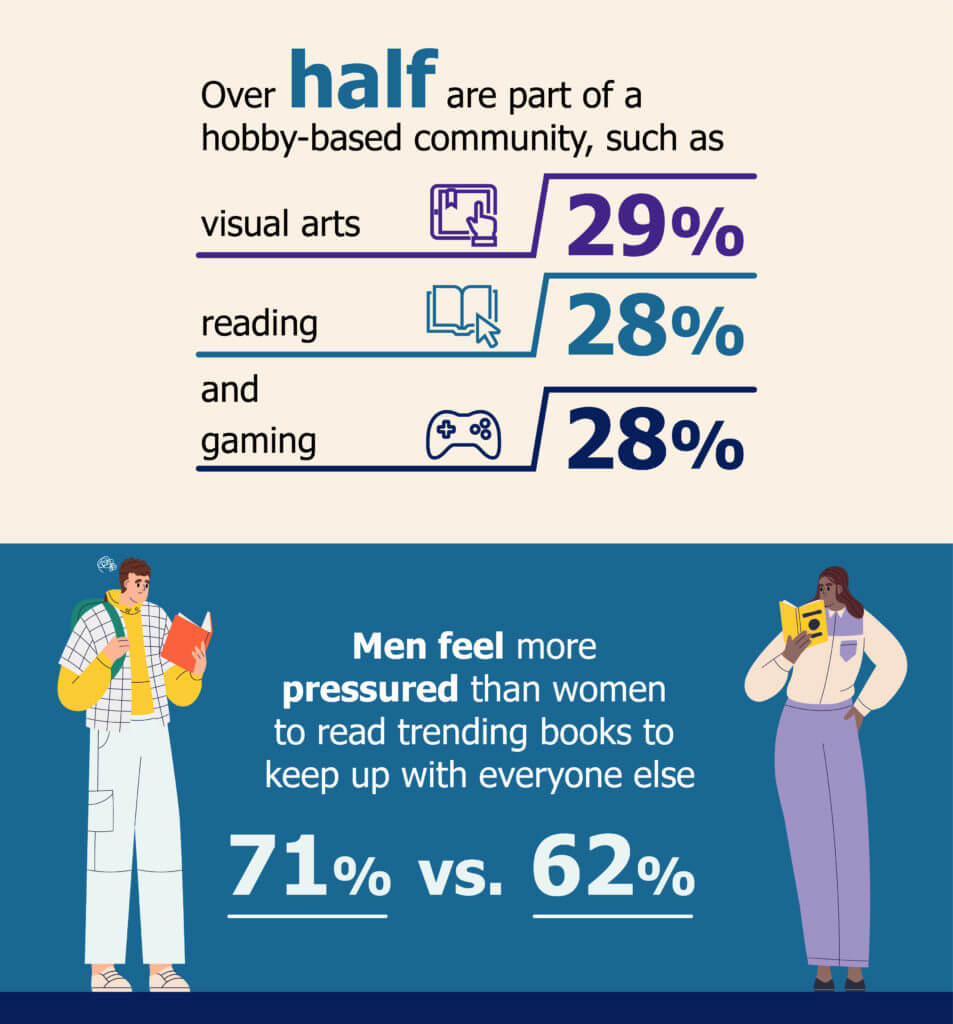NEW YORK — There’s no place like TikTok? More than seven in 10 (73%) Americans find it easier to relate to strangers in online communities than to people they know in real life.
The recent survey of 2,000 U.S. adults finds that 45 percent attribute this to being more comfortable communicating in written and visual form, and 43 percent say they can chat with their virtual pals for longer periods of time. More than a third (35%) feel a strong sense of community when discussing their favorite media, such as movies and books, online.
However, when it comes to trends, men feel more pressure than women to read the latest trending book to keep up with everyone else (71% vs. 62%).
Overall, over half the poll (55%) are part of a hobby-based community, with visual arts (29%), reading (28%), and gaming (28%) proving the most popular.
Conducted by OnePoll on behalf of ThriftBooks, the survey also concludes that social platforms are often the place to find recommendations or reviews for TV shows or series (59%), movies (56%), and books (52%). In particular, men are more likely than women to rely on social media for book (68% vs. 58%) and movie (62% vs. 52%) suggestions.
Seven in 10 (71%) were intrigued to learn more about a book because of a conversation on social media.
It doesn’t stop there, however, as 54 percent are “always” or “often” on a social platform while reading a book, more so than while watching a movie (46%).

Younger adults feel FOMO the most
Unfortunately, being so engaged online often leads to FOMO, especially when it comes to movies (57%) and TV shows or series (55%). Interestingly, Gen Z only is more afraid to miss out on reading (63%) than on series (49%), concerts (44%) and sporting events (37%).
Forty percent usually first hear of trending reads through social media, compared to 20 percent who rely on word of mouth.
Another 46 percent have been more envious of a #Shelfie, an image of someone’s bookshelf, rather than a selfie.
Readers are also getting literal about their literary picks, as 46 percent have found the “book” on Facebook, in addition to using Instagram (42%) and YouTube (42%) for book recommendations.
“Readers around the world have embraced social media as a way to connect with fellow book lovers, share their favorite picks, and bring beloved characters to life,” a spokesperson for ThirftBooks says in a statement. “It’s also a great way for people to find communities around their favorite books or authors that may not always be in their vicinity.”
Digital bragging rights
Some use social media to exercise their bragging rights. While members of Gen Z are most likely to highlight how many episodes of a series they’ve binge-watched (67%), they’ll also brag about dressing up as a character from a favorite book (58%) and proudly share the number of books they’ve read or own (49%).
Shared interests can bring people together, but disparate ones aren’t necessarily deal-breakers — especially among Gen Z respondents, who are more likely to befriend or start a relationship with someone who doesn’t like the same book than other generations (86%).
“From #BookTok to book club roundups, social media is a great gift-giving resource for the book lovers in your life, and can inspire your own wish lists, as well,” the spokesperson adds.
Survey methodology:
This random double-opt-in survey of 2,000 U.S. adults who use social media was commissioned by ThriftBooks between November 8 and November 11, 2022. It was conducted by market research company OnePoll, whose team members are members of the Market Research Society and have corporate membership to the American Association for Public Opinion Research (AAPOR) and the European Society for Opinion and Marketing Research (ESOMAR).
